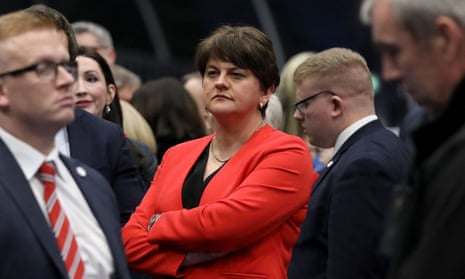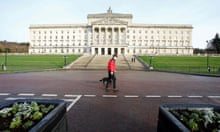Pressure is growing on the Democratic Unionist party and Sinn Féin to swiftly restore power sharing after voters punished both parties for political dysfunction in Northern Ireland.
DUP MPs who survived the party’s dreadful election unanimously called on Friday for a revival of the Stormont assembly, which collapsed three years ago.
Sinn Féin also felt voters’ wrath across Northern Ireland despite toppling the DUP’s deputy leader, Nigel Dodds, in Belfast North.
With Northern Ireland in the grip of a healthcare crisis, the election’s big winners were the moderate nationalist Social Democratic and Labour party (SDLP) and the non-aligned Alliance party, which prioritised the restoration of devolution over traditional tribal appeals.
Leo Varadkar, the Irish taoiseach, said the “tectonic” results showed there was no longer a unionist or nationalist majority in Northern Ireland – a trend reflected in other recent elections.
He discounted talk of momentum towards a united Ireland, saying the region’s parties should instead focus on a fresh round of talks, due to start on Monday, to restore the assembly, with prodding from Dublin and London.
“What hasn’t changed is that the future for us in Ireland is reconciliation, it’s power sharing, it’s closer cooperation between north and south and also between Britain and Ireland, and that’s the philosophy underpinning the Good Friday agreement,” Varadkar told the BBC.
The Northern Ireland secretary, Julian Smith, has given the parties a deadline of 13 January to restore power sharing or face an assembly election. The assembly collapsed in January 2017 in a row between the DUP and Sinn Féin.
Boris Johnson’s election victory, which has liberated him from dependence on DUP votes in Westminster, has added to the sense of urgency. He is expected to push through a Brexit deal that will create checks and inspections on trade between Northern Ireland and the rest of the UK.
Mike Nesbitt, a former leader of the Ulster Unionist party, told the BBC the election’s great irony was that for decades, unionists had feared Irish nationalism as the main threat to the union. “Then more recently it was Scottish nationalists, but it’s actually English nationalism which is posing the existential threat to the future of the union,” he said.
A total of 803,367 votes were cast in Northern Ireland, a turnout of 62%, to decide 18 seats.
The DUP won eight seats, making it the biggest party, but the tears and ashen faces of party workers on Friday betrayed the shock of losing two seats. In addition to losing the seat held by Dodds, a towering figure in the party, the DUP lost Emma Little-Pengelly’s seat in South Belfast to the SDLP’s Claire Hanna, who won a crushing 15,000-vote majority.
An Alliance surge also swept away DUP hopes in North Down, where it had expected to take a seat vacated by the independent unionist Sylvia Hermon. The DUP’s overall 5.4% drop in support slashed the majorities of Jeffrey Donaldson, Ian Paisley Jr and the party’s other MPs.
John Finucane’s unexpectedly wide victory over Dodds in Belfast North, the most bitterly fought contest, sent Sinn Féin into raptures.
Elsewhere, however, the party suffered serious setbacks, losing a seat in Derry and 6.9% overall support in apparent punishment for Stormont’s impasse and the party’s abstention from Westminster, which has sidelined Sinn Féin from Brexit debates. It emerged with seven seats, the same as before.
The SDLP’s Colum Eastwood ousted Sinn Féin’s MP in Foyle with a huge margin that underscored a comeback for the party of John Hume, which returns to Westminster with two seats.
The Alliance party also outperformed expectations, with Stephen Farry, the party’s deputy leader, taking North Down and making big inroads in other constituencies with an 8.9% surge in support, making it the third-biggest party and consolidating the middle ground in a region traditionally seen as binary.
Naomi Long, the Alliance leader, urged other party leaders to restore devolution and avert a fresh assembly election. “What is best for Northern Ireland is that those of us elected back in 2017 deliver an assembly, actually deliver it,” she said.








